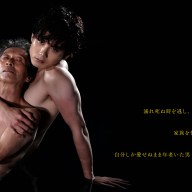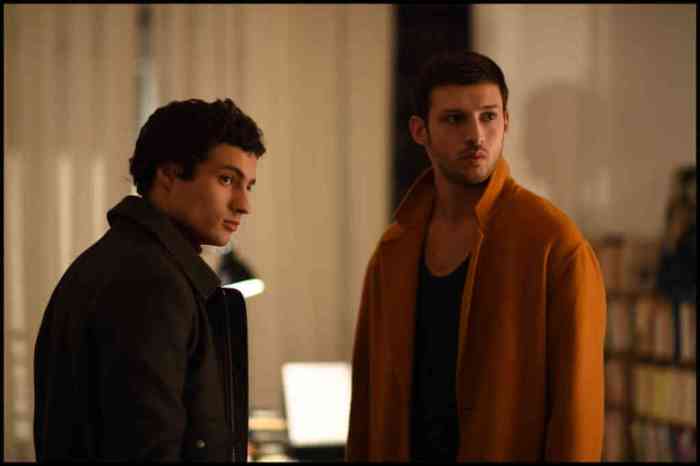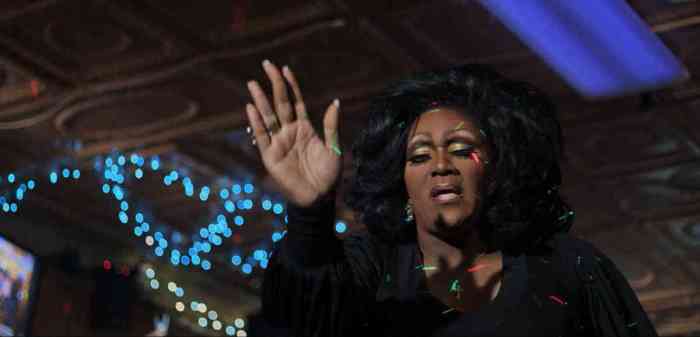Baya Madhaffar singing ,with Montassar Ayari in the background. | KINO LORBER
BY GARY M. KRAMER | The excellent drama “As I Open My Eyes” chronicles the coming of age of Farah (Baya Madhaffar), a baby-faced 18-year-old who lives in Tunis with her mother Hayet (Ghalia Benali). Farah, who is as unruly as her kinky hair, sings political songs in a band called Joujma. She is also romantically — and secretly — involved with her handsome bandmate Bohrène (Montassar Ayari).
This film, directed and co-written by Leyla Bouzid in her feature debut, is set in the summer of 2010, a few months before the Jasmine Revolution. The setting’s authenticity provides some nice texture to what might otherwise seem like a familiar story of a young person gaining wisdom.
An early scene has Farah drinking her first beer. Bouzid creates atmosphere as she focuses on the wizened faces of elderly men in the bar. Farah entertains an old drunk, who tells her that during the day he suffocates, but at night he is able to sing and his voice frees him. His words comment on her own situation; Farah’s music, which is soulful and mournful, is an expression of her emotional vulnerability but also of her strength.
A Tunisian girl rebels and also grows up
Farah is a rebel, and her mother is duly concerned about her — especially after Hayet’s friend Moncef (Youness Ferhi), a government employee, warns her that Farah is hanging out with people known to the police. Farah is shaming her mother and putting their lives in danger.
“As I Open My Eyes” slowly steps up the drama as Farah’s risky behavior escalates. Barred by Hayet from attending a concert, Farah locks her mother in her bedroom and escapes to perform. Though anxious about what she has done, Farah’s singing thrills and inspires her. Empowered by performing songs about the country’s poverty and inequality, Farah’s insistence that she do what she likes may have serious ramifications. When one evening a venue where the band is supposed to perform is closed, Farah takes to singing in the street, unmindful of warnings that she go home and stop courting trouble.
Farah is no bratty teen; instead she emerges as an engaging heroine who, though curious and reckless, is also deeply passionate. The film does not judge her actions. She may be petulant when asked to censor her singing and foolish when Bohrène warns her not to dance so provocatively, but she is willing to heed her father Mahmoud’s (Lassaad Jamoussi) counsel when he tells her to accept more responsibility for her actions.
Bouzid is thoughtful and unhurried in presenting Farah’s story. The film absorbs viewers as they soak up the rhythm of Farah’s life going back and forth from home to perform with her band. Eventually, a series of betrayals shift the direction of the story, and the political element lurking in the background overtakes the narrative.
“As I Open My Eyes” examines Farah’s maturation through familial, sexual, socio-cultural, and political lenses. She smiles at Bohrène’s clandestine affections in public, as when he touches her skin unbeknownst to others in a bar or kisses her under a tree. In turn, she peeks at his penis one morning after they sleep together. Over time, however, the lovers become more distant from each other, and when Farah publicly reads a letter Bohrène gave her their relationship changes dramatically.
The conflict that festers between mother and daughter also reveals Farah’s character. With Mahmoud away working in Gafsa, Hayet struggles to control Farah. A formidable character, Hayet tries to intimidate Farah by speeding through traffic in one of many contests of wills between them. But when Farah disrespects her, Hayet tells her daughter, “Consider me dead.” The mother and daughter’s battle intensifies, but when Farah is sent off to Gafsa to stay with her father, Hayet’s disposition changes.
“As I Open My Eyes” resists being overly melodramatic up until the ending. Bouzid’s neo-realist approach to the story is largely effective, and the cast of largely unprofessional actors offer naturalistic performances that ring true. (Ghalia Benali as Hayet is an exception to the non-actor rule here — just watch her expression and body language as customers in an all-male café stare at her when she enters looking for Farah one evening.) Baya Madhaffar delivers an auspicious turn as Farah, making her character’s difficult transformation from a self-centered teen to a wiser young woman credible and central to the film’s success.
AS I OPEN MY EYES | Directed by Leyla Bouzid | Kino Lorber | In Arabic with English subtitles | Opens Sep. 9 | Lincoln Plaza Cinema, 1886 Broadway at W. 62nd St. | lincolnplazacinema.com



































